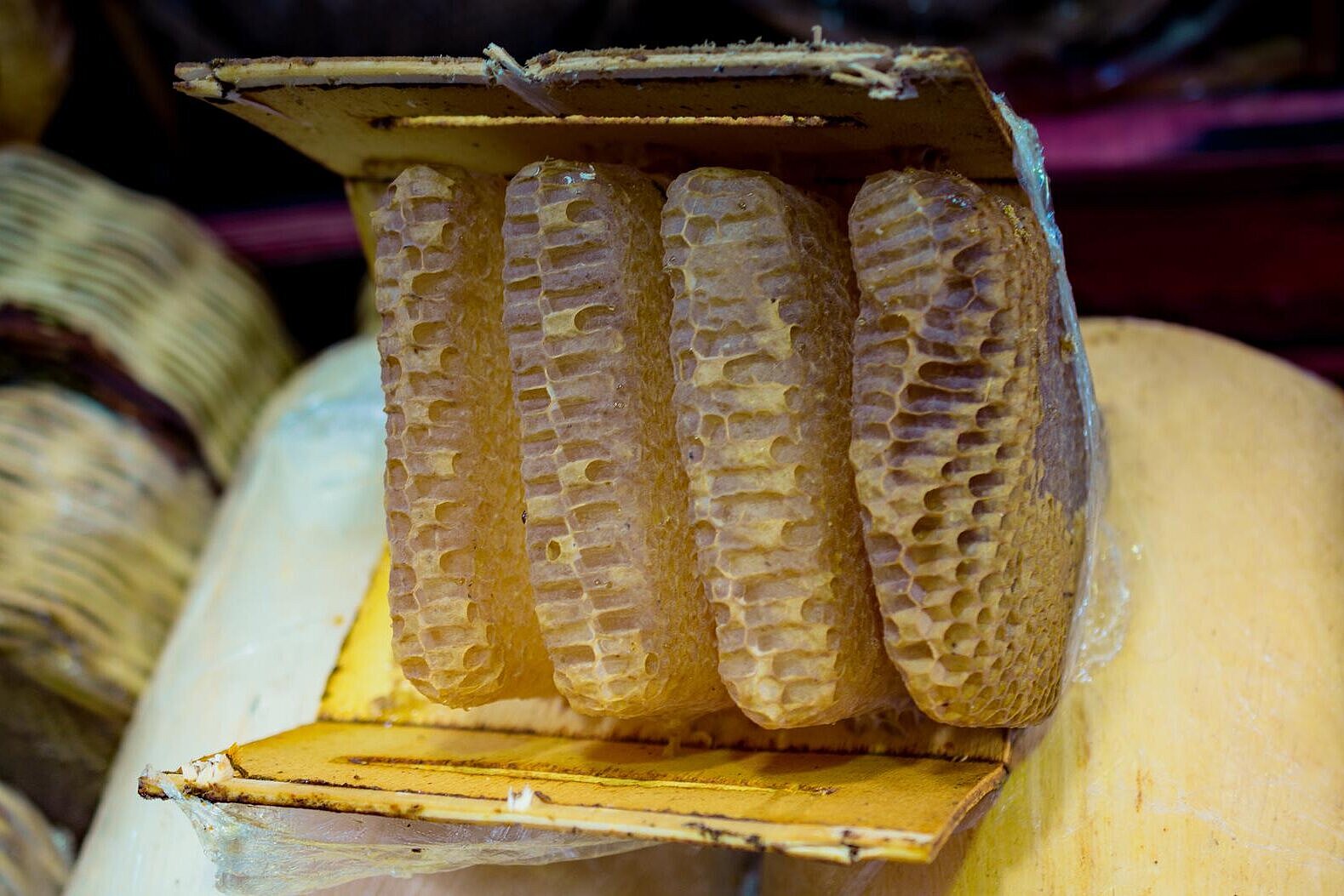Manuka honey

What is Manuka honey?
Manuka honey is no ordinary honey, but a natural product with a special composition. In addition to the usual sugars, enzymes, vitamins and minerals, it also contains a high amount of MGO, a substance that is only found in small quantities in other types of honey. MGO has a strong antibacterial effect and can help against various pathogens that can lead to infections in humans and dogs.
The MGO concentration in manuka honey is given in milligrams per kilogram (mg/kg) and can vary greatly depending on the origin and quality of the honey. The higher the MGO content, the stronger the antibacterial effect of the honey. There are different quality levels of manuka honey, which are labeled with a certificate. The most common are:
- UMF (Unique Manuka Factor): This is a quality standard set by the New Zealand Manuka Honey Association. In addition to the MGO content, it also measures other ingredients such as dihydroxyacetone (DHA) and leptosperin, which are important for the authenticity of manuka honey. The UMF scale ranges from 5+ to 20+, with higher numbers indicating higher quality.
- MGO (Methylglyoxal): This is a quality standard that only indicates the MGO content in the honey. It ranges from 30+ to 800+, with higher numbers indicating higher quality.
- KFactor: This is a quality standard developed by the New Zealand company Wedderspoon. In addition to the MGO content, it also measures other factors such as the pollen content, purity and sustainability of the honey. The KFactor scale ranges from 12 to 22, with higher numbers indicating higher quality.
Manuka honey is available in many health food stores, pharmacies and online stores. When buying, make sure that the honey has a valid certificate and comes from New Zealand. You should also make sure that the honey has not been heated or pasteurized, as this can destroy the valuable ingredients.
How does manuka honey work for dogs?
Manuka honey has many positive effects on your dog's health. It can be used both internally and externally, depending on the problem you want to treat. Here are some examples of the effects of manuka honey on dogs:
- Wound healing: manuka honey can help speed up healing and prevent infection for minor injuries such as abrasions, scratches or bites. You can apply a little honey directly to the wound and cover it with a bandage if necessary. The honey forms a protective film over the wound and inhibits the growth of bacteria. It also moisturizes and promotes the formation of new tissue.
- Skin problems: Manuka honey can also help with various skin problems such as eczema, dermatitis, hot spots or fungal infections. You can apply some honey to the affected area and leave it to work. The honey relieves itching, reduces inflammation and fights pathogens. It also nourishes the skin and makes it supple.
- Gastrointestinal complaints: Manuka honey can help with gastrointestinal complaints such as diarrhea, vomiting, flatulence or hyperacidity. You can mix a little honey into your dog's food or drinking water. Honey acts as a probiotic and promotes the growth of good bacteria in the gut. It also soothes the stomach lining and neutralizes excess acid.
- Immune system: Manuka honey can strengthen your dog's immune system and make it more resistant to illness. You can regularly mix some honey into your dog's food or drinking water. Honey contains many antioxidants that fight free radicals and prevent cell damage. It also contains many vitamins and minerals that are important for your dog's health.
- Mouth and dental hygiene: Manuka honey can improve your dog's mouth and dental hygiene and prevent tartar, tooth decay and gingivitis. To do this, you can apply some honey to your dog's teeth or gums or give him a spoonful to lick. Honey has an antibacterial effect and prevents the formation of plaque. It also freshens breath and whitens teeth.
How to dose Manuka honey for dogs?
The dosage of manuka honey for dogs depends on various factors, such as weight, age, health condition and the reason for use. In general, less is more, as too much honey can also lead to side effects such as obesity, diabetes or allergies. As a rule of thumb, you can use the following quantities as a guide:
- For wound healing or skin problems: apply about half a teaspoon per 10 kg of body weight per day directly to the wound or skin.
- For gastrointestinal complaints: Mix about half a teaspoon per 10 kg of body weight per day into food or drinking water.
- For the immune system : Mix about a fourth of a teaspoon per 10 kg body weight per day into the feed or drinking water.
- Formouth and dental hygiene: Apply about a fourth of a teaspoon per 10 kg body weight per day to the teeth or gums or give to lick.
These amounts are only guidelines and can be adjusted as required.
What should I bear in mind when using manuka honey for dogs?
Manuka honey is a natural and safe remedy for dogs when used correctly. However, there are a few things you should consider before giving your dog manuka honey:
- Allergies: although rare, some dogs can have an allergic reaction to manuka honey. This can manifest itself in symptoms such as a skin rash, itching, swelling or difficulty breathing. When you give your dog manuka honey for the first time, you should therefore test a small amount and observe how he reacts to it. If you notice signs of an allergic reaction.
Manuka honey is a special natural product with a lot of MGO, which has strong antibacterial properties. There are different quality standards such as UMF, MGO and KFactor. The honey can heal wounds in dogs, alleviate skin problems, treat gastrointestinal complaints, strengthen the immune system and improve oral and dental hygiene. The dosage depends on the dog's weight and state of health. Allergic reactions should be taken into account.
If you notice any signs of hypersensitivity or poisoning in your dog, you should see your vet immediately. We are not a substitute for a vet, but we try to be as accurate as possible. Every dog reacts differently and we recommend you get a second opinion or consult your vet if in doubt.
Stay healthy and take good care of your four-legged friend!😊
Similar to Manuka honey
Honey is a natural product made by bees from the nectar of flowers or the honeydew of plants. The bees collect the nectar or honeydew, carry it in their honey stomachs to the beehive and pass it on...
Propolis is a resinous substance collected by bees from the plant kingdom and mixed with their saliva and wax. Bees use propolis to protect, disinfect and insulate their hive. Propolis contains many...
Beeswax is the secretion of four pairs of wax glands on the abdomen of bees. The bees chew the wax softly and use it to form the hexagonal cells of their honeycombs. In these cells they store honey...
Sugar is generally not dangerous for dogs. In small amounts, it can even have positive effects, for example: It improves mood and well-beingIt helps with regeneration after physical exertionIt...



